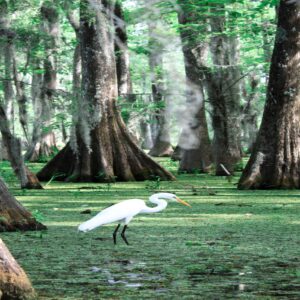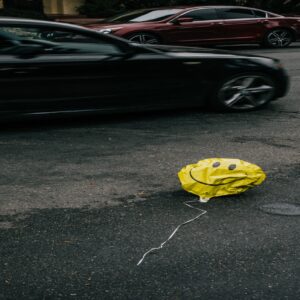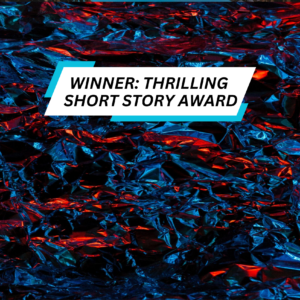I hooked the orange pill bottle from Dad’s shirt pocket and flushed the rest of the oxy down the toilet, then sat for a while on the pullout couch in the living room where his body lay. It was clear when I walked in from the graduation ceremony that he was dead, so I took my time getting out of my cap and gown, folding the cheap blue robes over the kitchen chair, laying the cap on top. Dad would have mocked the get-up. By the time his own rolled around, he was already trolling the folk circuits, trying to hit it big with a pawn shop guitar and a voice prematurely fried from too many Marlboros and shots of Evan Williams. His burnout was fast and definitive. Wearing the robe now seemed to invite the comparison. I half-expected him to rise from the floor, Night of the Living Dead style, grin through his cracked lips, and ask: who do you think you are, Lucky Novak? You’ll never leave this place.
I wondered if he knew what was happening, whether he had time to feel the euphoria sharpening into something fatal. I imagined his eyelids growing heavier, then closing to an eternal, starless night.
Panic seeped into my veins like poison.
It wouldn’t be immediately clear that I had given him the pills. Orange City was drowning in oxy. The dealer could have been any one of hundreds of laid-off migrant workers or tourist trap ticket takers sick of sweating in booths all day. But I didn’t like the ifs, the cracks where I could get stuck. If the police asked around, it could get back to the people I bought from, and if they ran a tox screen, there’s a good chance they would discover a lethal dose of oxy cut with fentanyl in his veins, the same bad batch that had been floating around town for weeks.
Tracking that wouldn’t be difficult, and scholarships get rescinded all the time, especially for charity cases like mine.
I searched through Mom’s choppy, handwritten phone numbers in the junk drawer to find Jerry’s. Over the years he had rotated through a series of phone numbers that I had never taken the time to memorize. He was three years older than me, and I’d seen little of him in the last few years–I knew he was working construction; I spotted once him wearing a neon vest on the side of the highway, waving cars past roadwork. He ducked out of school two months shy of graduation after Dad shattered his nose.
I was betting on that last memory to work in my favor.
By the time he picked up, I had rolled the lie around in my head like a hunk of wet clay until it resembled something believable.
Mom’s out of town. He must have broken in again. Probably a heart attack. I need help.
When he arrived, the parking lot was thick with shadows. He hesitated on the threshold, as if he might not enter, then stepped past me. I checked over his shoulder and was relieved to see his beat-up Oldsmobile pulled to the curb.
Weak afternoon sun seeped through the sliding glass doors. A Disney tumbler, bought during our one and only family trip, was wedged beneath the TV console table, the black bumps of Mickey Mouse ears peeking from beneath. Dad’s hand was outstretched, pointing towards the kitchen, and the other was curled underneath his chest, a yellow foam crusted to his blue lips. His eyes were open: bloodshot and vacant. He had deflated somehow, in the last few hours, like an exhausted birthday balloon.
Jerry moved towards the body, stopped, and sank into the couch, his fingers coming together to lace under his chin, eyes glued on the figure at his feet.
I took a cotton sheet from the linen closet and draped it over the body, and suddenly, it became just another piece of furniture, a shape amid other shapes– a bland, white topography, no longer threatening.
“I’m going to use the bathroom,” Jerry said, voice hitching, and disappeared into the hallway. I walked to the kitchen table, touched the freshman orientation brochure tossed there. The group of students smiling beside a sunlit, brick and ivy building: a school located hours and hours away from Orange City. I had grinded and saved for two years to pay dorm and tuition through the first semester. After that, an offer to work the shrimp and crab boats off the Gulf Coast during the breaks to make up the rest. Just had to get up there first. Just needed to get out of Orange City.
Jerry returned a few minutes later and stood rigid in the kitchen, scanning the photos Mom had stuck on the refrigerator, ones of us as kids, in itchy red and green Christmas sweaters standing on the hearth of our grandparent’s fireplace. He moved to the health spa flyer; Mom’s words of affirmation scrawled across sticky notes papering the front of the refrigerator.
He lingered in front of the fridge for a long time, thumbing through the notes, and when he straightened, his eyes traveled to the robe folded on the chair.
“Was that today?”
I nodded. “Few hours ago.”
“You didn’t tell me.”
“If it makes you feel better, I didn’t tell anyone.”
“Mom’s going to be disappointed. Only high school grad in the family, and she didn’t get to see you walk.”
I shrugged. “She’s where she needs to be.”
Silence filled the space. Jerry’s boots scratched the linoleum.
“Were you serious on the phone?”
My admission paperwork was stacked on the table, and I thumbed the trifold brochure. “She’s at a wellness retreat; she’ll be home tomorrow morning.”
“You didn’t answer my question.”
“She’s better. She’s exercising; she’s been working at the pharmacy for almost a year now. They’re thinking about making her manager.”
We both had seen Mom sink so low she barely made it out of bed for weeks, her eyes windows full of dark clouds, usually a result of one of her rows with Dad.
“Ever since she kicked him out a year ago, things have been better, but I don’t know how long that’ll last. Seeing him like this–it’ll set her back. It’s different knowing your ex is out there kicking up trouble for someone else and knowing he’s in the ground.”
“You don’t know that,” he said quietly.
“I know it better than you.”
“Why do you think…” he said, shaking his head.
He looked like a bass trying to wriggle off a hook.
###
I figured he’d help because I was his younger brother, and three years was enough time for that guilt of abandoning me to build up. It was a long shot, but I was right.
“Out by the ‘Boil,” he said, rubbing his jaw, “we’re doing some work, dredging the river, removing debris and sediment…anyway, was out there last week, out where we used to dive for shark teeth. I watched a log kind of bob in the water; it missed the dredger, but the force of the river buried it in the bank.”
I looked up from the couch.
“The Gator Boil? Where Dad used to play?” I remembered a ramshackle place beside the river. Mom was forced to drive stick because Dad was too pickled after his set to get us home.
“It had to weigh at least three hundred pounds.”
“They leave that dredger going all the time?”
Jerry chewed his cheek. “Not supposed to. On a deadline, though, people are starting to cut corners. Besides, that whole place is going to be covered in three feet of concrete in a week.”
I looked down at the sheet. It wasn’t Dad. It was a problem, an obstacle, and the faster we had this done, the sooner I could put him and this town behind me.
###
We waited until dark, then reversed the Oldsmobile almost to the front door, opening the trunk and tossing out heaps of random tools: a shovel, coils of chicken wire, and an emergency roadside kit. Working quickly, we wrapped the body in layers of sheets, then a comforter, flopping the rigid length of him until he was rolled tight like a pale cigar.
I kept watch outside beneath a stretch of awning, searching for neighbors, but the lot was empty. I rapped quietly on the door, and Jerry came out, struggling with the heavy bundle draped over his shoulder.
When we opened the trunk, I helped bend the stiff legs inwards, the bones creaking under our hands like old boards, until they fit into the space. For a moment, I almost told Jerry to take the body out and rearrange it so he would be more comfortable, then stopped myself. My throat constricted and I rubbed the back of my neck until the feeling subsided and the closed trunk cut the site from view. Jerry panted, sweat trickling down from his temples as he started the Oldsmobile.
The Boil was close, accessible by a crosshatch of deserted roads lined with fresh housing developments and abandoned lots. I marked the distance by the for-sale signs sunk in concrete, leaning into the roads with documents riffling in the wind like white gloves waving.
The roads were empty and quiet. Most of the town would be over on main street watching from the hastily assembled bleachers as the graduating class marched down the street in their Orange City Pickers shirts. In another life, I’m there with them, looking for my family as they cheer from the sidelines under the glowing streetlamps before heading to dinner or a kegger, the universe all neat and purposeful as a brand-new baseball glove.
We kept the stereo off.
Jerry’s mouth seemed to move as if he was whispering something under his breath, not until we pulled off into the sandy peninsula and cut the engine did he lean over, place his hand on the back of the headrest, and stare at me. Ahead I could see the Boil forlorn on the lip of the river, doors locked, lights extinguished, the water glinting darkly beyond.
“Looked like an OD,” he said.
It was like he’d yanked my ripcord, and I was being jerked upwards through the roof of the car. He waited until I met his gaze, then he reached into his pocket and brought something out to tap against the steering wheel. The empty orange pill bottle had a label like a tattered white flag.
The bottle clicked hollowly.
“Found this in the bathroom,” he said, voice flat.
“Jerry,” I fumbled.
“This was about Mom, right? Protecting her? Not you?” His hand was clenched around the bottle now, the plastic bending. “You know how he got these, don’t you?”
I stared through the windshield, heart hammering. Outside, the woods and the river and the sky seemed to push towards the car like something alive, something hungry. This town was haunted. At night, I imagined I could hear it groaning in the dark, like something alive but sickly, throwing out a hand to drag me to its bedside. Dad had been feasted on by it, and now Jerry too, with his collapsing shoulders, hands stuffed into the pockets of his paint-splattered Wranglers, a slight pot belly forming under his t-shirt.
I wouldn’t let it gnaw me up, too. I balled my hands into fists.
“He found out,” I said.
Jerry was quiet.
“I was selling, for school. You don’t–I never would have had the money on my own.”
Jerry’s eyes were wide, stunned. “You could have asked me for help–” his hand opened, grasping– “there’s aid, there’s–”
“Nothing, not for us. Mom makes too much for aid and not enough for anything else.”
Outside, the lone streetlamp flickered with mosquitoes.
“Did you know?” He asked.
“Know what?”
Jerry’s jaw clicked. “Did you know?” He repeated, slower.
But I knew what he was asking–that it was a risk, that there was a high probability that the pills I was supplying Dad with might kill him. That every bottle was a revolver fitted with an unknown number of bullets.
Did I warn him? Did I say anything before I pressed the drugs into his hand?
I continued, voice rickety: “He was a junkie. Started showing up at school. Whoever used to supply him must have cut him off. He knew he could hold it over my head–tell the school. He could have done anything he wanted.”
I remembered the look of slithering need uncoiling on Dad’s face last night when he showed up at the condo, the realization that it would never end, that I would be stuck here, chained to a monster, forced to keep it satisfied and sated forever.
Then I had walked out that morning in my robes to his loud snores on the couch and made sure that pill bottle was nice and close to him on that coffee table.
We sat in silence. I wondered if this would be enough, if it had given Jerry what he needed. It wasn’t the whole truth, not even close, but it sketched the picture.
Jerry rolled his shoulders, pulling away from the seat. His jaw clenched and his eyebrows wavered as he worked something out. My heart throbbed, and my throat felt raw.
“We’re going to the hospital,” he said.
Flares of panic blazed to life.
“Jerry, you can’t be– “
The key went into the ignition, the headlights flooding the parking lot, the grass, the river, and the faint rectangular outline of the generator powering the dredger.
Jerry’s eyes were angry slits as his hand reached over to shove the transmission into reverse.
I hit him.
The blow glanced off his right cheekbone, sudden enough to stun him and snap his head back to crack against the window. The shock ran up my arm, the numbness in my hand masking the pain that was driving to the surface. While Jerry held his hand to his face, dazed, I leaned across his lap and tugged the trunk lever, then kicked the door open and leapt out.
If I could get the body into the water, there would be nothing he could do.
The trunk was still creaking when I wrenched it up and grabbed a handful of comforters, my right hand screaming. Jerry yelled something and fumbled with the door handle from inside the cab.
I heaved, throwing my weight backward, and the body slid from the trunk and hit the gravel. I landed on my back, the body falling across my shins. I kicked him away and stood up.
Jerry’s right eye was already swelling, and for a second, I wanted to ask him who had hit him, but his hands were in my shirt, his teeth in my face, gritted to keep from screaming.
“Are you out of your mind,” he hissed, then pushed me away. My foot caught one of the sheets, and I went down hard, my shoulder taking most of my weight.
I fought the urge to cry out, laying there instead, rolling, hoping I could channel some of the pain back into the earth. For some reason, my mind flashed to that freshman orientation brochure: cool air blowing between red and brown brick buildings, broad maple trees, and acres of soft green grass.
Jerry was huffing, hands on his knees. He gingerly touched his cheekbone and winced, then quickly scanned over the parking lot, the closed restaurant, double-checking we were alone.
He leaned down and took a handful of the sheets, and began dragging the body backward toward the open trunk.
“You were never there,” I said, the words ripping free from someplace deep in my chest where they had festered, quietly, for years.
Jerry paused, still bent over, squinting. His blond hair was stuck to his forehead in wet strands.
I was on my knees now, hands in my lap, squeezing. I couldn’t remember getting off the ground.
“You left me alone, with him–you left Mom alone with him, and you never came back.” A faucet of rage like black bile turned on, and there was no way to shut it off.
His mouth worked drily: “You think that anything you say is going to make what you did ok? Whatever you think I did to Mom, how do you think she’s going to feel when she finds out you had something to do with this?” He jerked the body up and down.
I got to my feet, unsteadily. “You could leave–” I pointed at my chest, “I had to stay.”
Jerry scuffled over the dry sand, ancient seashells scraping at his boots. Suddenly, he dropped the body, sucking in air.
He wagged his finger, “You really didn’t think this through, did you? Here I am thinking you had some big plan–but you really don’t, do you?”
I could only stare at him. The world seemed to pulse in at the edges, the cone of light where we stood fading in and out.
He began to list on his fingers: “You don’t know how he got to the condo–where’s his car? What’s going to happen when the police track a missing person to Mom’s front door? Do you even know that they would have questioned you if you had just called it in?” He stopped, shaking his head, “All you did was make it harder on yourself, Lucky.” He seemed to land on something: “I don’t think you wanted to hide this from Mom or the police–” he said, “I think you needed to hide it from you.”
I took a step forward. “You think I feel guilty?” The words shook loose, incredulous, “because I don’t. Not for anything.”
Something dark was spilling out, oozing past my teeth. The empty parking lot and the snarl of the dredger in the river all faded into the background.
“Look at yourself, Jerry. “This is you getting out?” I waved him away, as if erasing him from the night, “–this is you hitting it big time? Pressure washing and paint jobs?”
“You little shit,” he said, and this hurt somehow worse than my shoulder because no matter what I’d ever thrown at him, Jerry had never stooped low to hit me back or call me a name, but now his face was twisted in pain; we’d crossed over somewhere new with no borders.
He pointed to the shape on the ground: “This is where your dreams got you, Luck.” He shrugged, “looks like you’re just as white trash as the rest of us.”
Headlights arced across the lot, slicing in the sky above our heads, moving down over the tops of the pine trees and settling to the right of where I stood and growing larger.
We darted.
Jerry retreated, starting towards the car then sprinting to the edge of the ‘Boil, to the plank wall where the dumpsters were kept.
I lunged forward to the body.
My shoulder ached, but now that the body was on loose shale, I was able to lift the covers and slide it across. I saw the silhouette of Jerry ducked low inside the trash shelter, distracted by the truck’s high beams clawing through the trees. I continued, faster, drawing closer to the sound of the dredger growling in the night. I kept one ear focused on the single road that led to the ‘Boil, the screech of the cattle gate riding the wind like a banshee.
Steps of oak decked in algae lead below the oily water.
I scrabbled closer, not waiting for either the car or Jerry to stop me. I braced my foot against the mass of comforters and the body rocked forward, then I placed both hands on it, ignoring the cold flesh pressing through the blankets, and pushed. The body tumbled into the water.
I slid in after it, pushing past the first rush of water that shocked my legs and sent goosebumps rippling over my arms.
Down the length of the river, the dredger lay coiled and throbbing like an anaconda, and near the far edge, I heard muck and debris being buried into the bank and saw the V ripple of water, the undertow that would drive the body home.
I surged into the water, wrapping a hand into the sheet under the shoulder, and tugged, the weight of the sheets and comforter nearly taking me with it until I dug my feet into the sand and pressed into the current, sinking each step carefully down into the mud to anchor myself.
I swam to the opposite bank, dragging the body after me until I could twist one hand into the long grass, disregarding the moccasins that could be waiting just beyond my fist.
It was difficult from here to see the bend in the river. If the body missed, it could bypass the dredger and float all the way into the center of town.
I gave the body a little push and let go.
The body bobbed, a layer of comforter peeling back to expose a pale shoulder, a knob of bone-white skin.
I waded back across the river to where Jerry was now standing, the car gone, a wrong turn maybe, and the night was again empty and black. He sucked in air and craned his neck to keep an eye on the shape disappearing downriver. I had forced his hand. He had driven here with the body in his trunk, whatever happened next fell on both of us.
The body pitched onto its side, the limbs which had been tucked in by sheets unfurling in the current. We stopped where the dredger greedily drank at the water, creating the suction of force into which the body needed to slip.
It was turning in the water like a polarized needle when Jerry pointed at something in the dark. Branches from a submerged tree trunk combed the water-like fingers through a wave of onyx hair. The body collided, tilting forward, bending slightly as the force of the river caused it to bunch up, and for a second, I thought it would free itself, twist around the clump of debris, but it remained. A crooked cocoon bobbing in the current.
Jerry jumped from the shore and paddled hard into the current, reaching the body before I could think to move. He ducked his head under twice, whipped the water from his face, and rocked the body back and forth on its easel.
“Can you get it?” I yelled, and Jerry’s head twitched negative.
He made a sawing motion: “Knife!”
I sprinted to the Oldsmobile.
Within a few steps of the car, I froze: Jerry’s toolbox sat on the porch of the condo, taken out to make room in the trunk.
A choking scream unraveled in the night.
I raced back, skidding to a stop along the bank.
The water was empty. The twiggy fist was still there, clutching the comforter, but the body had disappeared, along with Jerry.
“Jerry!” I called, but there was no return sound beyond the cough of the dredger and the sudden swell of mosquitoes reasserting themselves.
I scanned the far bank, turning to see if I had swum to the far side.
Something surfaced from the inky depths a dozen yards away: a bleached mask attached to a swollen dummy. A shock sent icy waves down my spine. Was it grinning?It was far from where I stood, slipping towards the Y that would send it downriver, past the dredger, to town. Panic felt like an animal clawing away at the inside of my chest. I aimed toward the glassy area between the dredger and the far shore and leapt, flailing at the water as I sucked at my clothes, bringing me closer to the machine. I felt the pulse of it underwater, the surge of the current snatching my legs.
I scissored, trying to bring myself upright and brace myself against it, but the riverbed was still a yard underneath me. I pushed forward instead, trying to cut the distance between me and the body. A cough and sputter, and I whipped around to see Jerry, his face a white oval of terror, gasping and thrashing near the dredger attached to his sleeve, swallowing him whole.
I turned again as the body disappeared around the bend, still within reach if I paddled hard enough. Behind, Jerry’s scream became a choked gargle, and a memory flooded back:
Jerry stood between me and Dad, a thin bulwark against a crushing wave, as Dad’s hand came down to crack against Jerry’s nose. The blow was meant for me, who had slapped his tumbler of Tito’s, sending it shimmering across the carpet, drops of liquid collecting on it like dew. Minutes before, I had picked up Jerry’s guitar, settled it across my knees, and, with a strum, sent a few weak chords into the room. Dad had been walking from the bathroom to the living room, nose swollen red with drink, and had leaned into the doorway. I took a chance, and I looked up, eager to see if I had done well and if he was proud. His eyes were glassy, wandering, as if I wasn’t even there. Then he laughed. A scoffing, brittle bark that shattered something in my chest. I could almost hear the sound it of it breaking. I dropped the guitar, walked to where he sat, and hit the drink from his hand. Dad had risen then, cresting like a wave over me, omnipotent and merciless and filled with cold fury, and Jerry had thrown himself in the path of his fist.
I remembered the slipping away, like saltwater drifting from a beach, the anger spent. I remembered Jerry lifting himself from the floor, a glance through his tears and blood to me, who could only stand frozen to the spot. I didn’t say a thing as Jerry packed his few things into a duffel and left. I didn’t follow him. I didn’t stop him.
I used the river’s momentum to shoot forward to where I could sense Jerry’s body going limp.
In the sprawl of black, sloshing water, I linked both arms under him and brought his mouth above the surface. My other arm found the bit of sleeve caught in the machine. I pulled, feeling it rip, then finally give, and Jerry’s full weight pressed down on my shoulder with a pain like an icepick chiseling into the bone.
I pushed against the current, feeling it skitter around me in bursts of silver bubbles as Jerry’s head cracked painfully into mine. I paddled faster. I gripped the shore, now out of the worst of the current, and threw us forward, my shoulder screaming, until I reached the canoe launch and pushed Jerry onto the ramp.
Before I had a chance to bring my fist down on Jerry’s chest, he was already gagging, vomiting brown river water out of both corners of his mouth. I pulled him to the side, pounding his back.
I fell next to him on the ramp, the oak slides jamming into my tailbone. Jerry hacked deep in his throat, then sneezed snot rimmed in red and lifted himself upright.
The dredger continued to thrum.
I wiped my face.
Jerry rolled towards me. “Where–”
I shook my head. “It’s okay.”
I took my shoes from where I had kicked them off on the bank, then grabbed the keys lying next to us on the ground and tossed them when Jerry had gone into the water. “I’ll drive.”
Jerry shivered in the passenger seat. The wind blew through the open window, clearing away the stench of old paint fumes, filling it with the clean night air and the sweet scent of orange blossoms.
My skull felt picked clean. I clicked the stereo on, twisting the knob until music blared from the speakers, the melody spilling out, filling me up.
I pictured the body downriver, a hundred yards from where we drove, navigating the still water, with eyes like cracked glass gazing absently at the stars.




